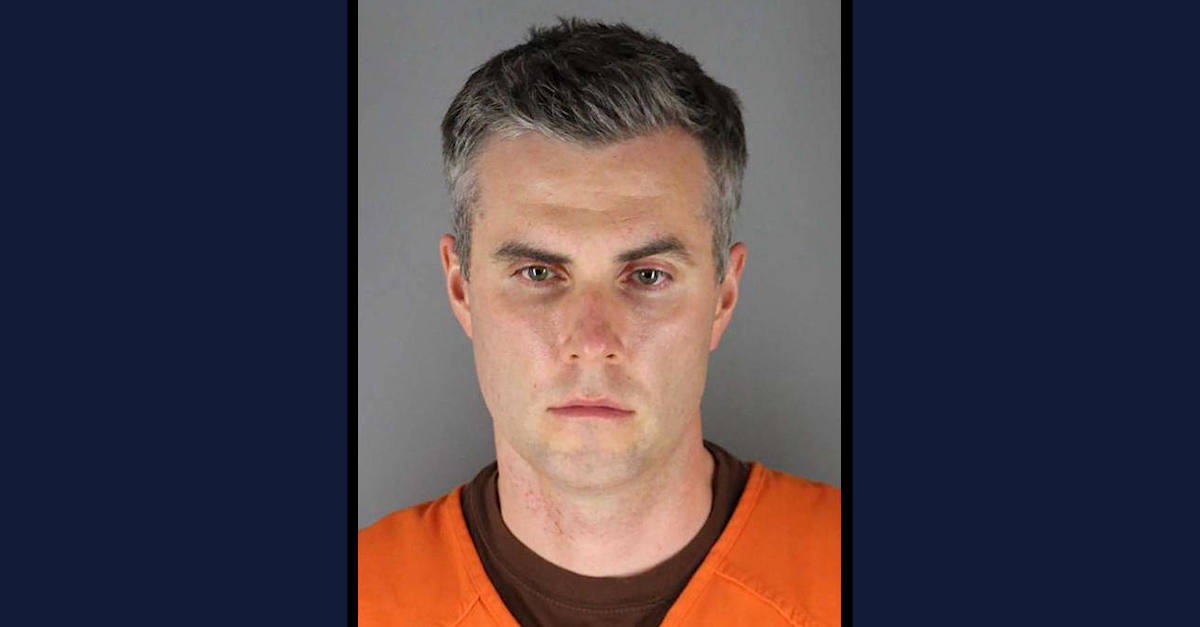
Former Minneapolis police officer Thomas Lane appears in a Hennepin County Sheriff’s Office mugshot from 2020.
A federal judge in the District of Minnesota on Thursday sentenced former Minneapolis police officer Thomas Lane to two and a half years (30 months) in prison in connection with the death of George Floyd Jr., according to Associated Press reports from the courtroom.
Lane and fellow officers Derek Chauvin, Tou Thao, and J. Alexander Kueng were indicted on May 6, 2021, via a three-count instrument. All three counts alleged the deprivation of Floyd’s rights under the color of law in violation of 18 U.S.C. § 242. Only the third count applied to Lane.
Federal prosecutors reportedly told a jury that the former officers “chose to do nothing” when Chauvin pressed his knee against Floyd’s neck on May 25, 2020. Lane, Thao, and Kueng testified in their own defense during their federal trials. A jury convicted all three men on Feb. 24. Prosecutors summarized the crux of the charge — and the conviction — this way:
The jury found that the defendant willfully deprived George Floyd of the right to be free from a police officer’s deliberate indifference to his serious medical needs, by seeing Mr. Floyd lying on the ground in clear need of medical care, and willfully failing to aid him. The jury found that this offense, as charged in Count Three of the Indictment, resulted in bodily injury to and the death of Mr. Floyd.
Lane pleaded guilty to second-degree manslaughter in separate and subsequent state court proceedings on May 18 of this year.
Federal prosecutors sought a sentence of somewhere between 68 and 73 months — or about five and a half to a little more than six years — according to a sentencing memorandum dated June 29. That is within the normal guidelines range for the crime the jury convicted Lane of committing.
“As the jury necessarily found, the defendant recognized that George Floyd was suffering from a serious medical need and failed to provide him with the basic medical aid that the defendant was trained and duty-bound to give at a time when that aid could have made a difference,” prosecutors wrote in the memorandum. “Although the defendant did not intend for Mr. Floyd to die, the defendant’s failure to provide medical aid had serious consequences for Mr. Floyd, Mr. Floyd’s family, defendant Lane’s fellow law enforcement officers, and the broader community. A guideline sentence is justified by the gravity and impact of his inaction.”
According to the government’s sentencing memo, Lane objected to a presentence report via what the court docket indicates is a series of sealed or restricted filings. One of Lane’s objections, according to the government, was that an upward (read: more serious) sentencing adjustment “should not apply where the victim was lawfully restrained.”
Prosecutors rebutted that suggestion with the following:
Defendant Lane’s handcuffing and his initial restraint of Mr. Floyd may have been reasonable and within the law, but this does not preclude the application of the restraint guideline when Mr. Floyd remained handcuffed and restrained on the ground throughout the offense. Indeed, despite its initial lawfulness, the officers’ prone restraint of Mr. Floyd quickly became unlawful, and the officers’ continued restraint of Mr. Floyd as his medical condition deteriorated directly contributed to his death.
Next, Lane objected by claiming he was but a “minimal participant in the offense” and thus deserved a lighter sentence.
Again, prosecutors rebutted accordingly:
Here, defendant Lane was convicted of deliberate indifference to Mr. Floyd’s serious medical needs in violation of 18 U.S.C. § 242. All four defendants were charged with that offense, and all four defendants shared equally the duty to render aid to Mr. Floyd, who died in their joint custody. According to the expert medical testimony at trial, had any one of them repositioned Mr. Floyd onto his side when he was still breathing, Mr. Floyd would have lived. Had any defendant performed CPR during the initial minutes after Mr. Floyd lost a pulse, it may also have saved his life. Defendant Lane is not substantially less culpable for his failure to render medical aid than the other defendants. Based on his statements on the scene indicating that he knew the correct action was to roll Mr. Floyd on his side, his stated observations that Mr. Floyd was passing out, and his recognition that Officer Kueng could not find a pulse, he made plain he possessed the knowledge to save Mr. Floyd’s life—yet he chose not to act.
Elsewhere, in pre-sentencing arguments, Lane attempted to argue that he has accepted responsibility for his crime and therefore deserved a break. Prosecutors disagreed:
Defendant Lane, as was his constitutional right, contested factual elements of his guilt at trial, arguing that the evidence failed to prove that he had acted willfully or with deliberate indifference. He contended that he had provided medical care to Mr. Floyd when Mr. Floyd was restrained on the ground by calling an ambulance, suggesting that the officers restrain Mr. Floyd with a hobble, and asking whether they should roll Mr. Floyd on his side.
The government continued in a footnote:
To the extent that defendant Lane now argues that his actions after Mr. Floyd was placed in the ambulance demonstrate the defendant’s acceptance of responsibility, the defendant’s failure to tell Sgt. Pleoger and Lt. Zimmerman about the nature and extent of Chauvin’s restraint and the seriousness of Mr. Floyd’s condition — i.e., that he was pulseless and not breathing — undercut the defendant’s argument.
The government’s sentencing memo is below: